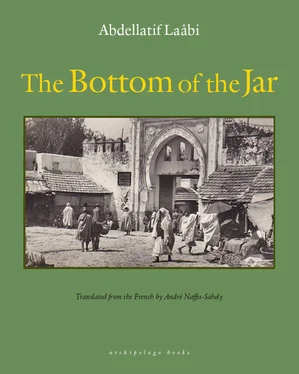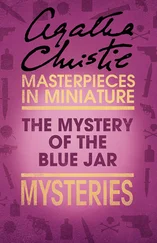“That’s me.”
“Well then, here you go, and please sign this for me.”
“What do you mean sign?”
“You know how to write, don’t you?”
“Yes.”
“So take this pen and write your name there.”
I got through this unforeseen exercise, tore the package from the inspector. . I mean, postman, and dashed back into the house. I took the steps to the terrace two at a time, feeling the need to be out of sight so I could discover the contents of the package. Once there, panting — as much from the agitated state I was in as from having flown up the stairs — I savored that precious moment slowly. It was the first time I had received anything in the post. My jubilation was similar to what athletes must experience as they cross the finish line to win a race. Except that there were no spectators, and as far as applause went, I heard nothing but the shrill sound coming out of a stork’s beak. I finally opened the package and pulled out the long-hoped-for gift: a bar of scented soap, whose brand name I cannot keep to myself this time, without which the magic of the moment wouldn’t be properly conveyed. Ah, the joys of Cadum! I was gripped by euphoria. Similar to the euphoria the baby depicted on the soap’s shiny paper wrapping seemed to be experiencing. A brilliant smile leaping from his chubby cheeks. I suddenly felt a sort of paternal love at the sight of that cherub. Oh, it was too much for my heart to take!
As I left the terrace and descended the stairs, I restrained myself from advertising this godsend. I hid the bar of soap and decided I wouldn’t use it until my next trip to the hammam. The little pink cloud upon which I was floating helped me brave the blows that fate had in store for us.
JUST WHEN WE’D thought that the threats menacing our family had passed us by, we discovered “one fine morning” that soldiers had been posted in front of our door. They weren’t there to “pay us a visit” or because of the investigation into the khatib ’s murder. No, they were there for the long haul. How could we interpret their presence? Had we been targeted and placed under house arrest, or was this part of more widespread measures? Driss wanted to know more. For safety’s sake, he decided that no one should leave the house. He set out on a fact-finding mission. Ghita was at a loss, words failed her. Before letting him go, she made sure he had enough warm clothes on: one djellaba on top of another and woolen socks. She took to this with an uncharacteristic meticulousness, looking fondly at him with tears in her eyes. He left. We waited for him, our hearts in our throats, our ears glued to the door. When he returned to us safe and sound, anxiety was written on his face.
“What we feared has come to pass,” he said. “The soldiers have taken over the city. They have been posted to each square, each souk, and each road. They ask you who you are and where you are going before they let you through. If your hands are in your pockets, they order you to take them out. Make sure to walk slowly, even if you’re in a hurry. They have ‘red eyes,’ oh Latif, and their fingers are on the trigger. I don’t know what our leaders are going to do, but there is talk that they’re planning to respond in a way that matches the gravity of this provocation. They didn’t want to tell me more, their secrets needed to be kept. Now you’ve heard me and have understood what I’ve said. When you go out into the street, make your way slowly, as if nothing were wrong. Avoid running and don’t make eye contact with the soldiers. You won’t find anything in those troubling faces.”
We stepped in line and organized our lives accordingly. Fez was occupied! Nothing of the sort had been witnessed in living memory. Our instincts warned us that such a situation wasn’t made to last. No army had ever been able to control our labyrinthine Medina. What about the hanging labyrinth? Everyone knew that you could move across town by cutting through one terrace after the other. Our fedayeen had no qualms about traveling in such a manner, and as far as giving orders or advising precautionary measures, Radio Medina was up to the task, without antennas.
Little by little, this bleak, topsy-turvy sort of life became routine. The soldiers on sentry duty in front of our house were visibly bored. They even started knocking on our door asking for a glass of water or for a can opener for their tins of preserved meat. This situation became ridiculous. Ghita broke the all-time record for contradictions. We heard her say, “Those poor men, forced to stay outside as if they were dogs. Without any sleep or real nourishment. He who is a true Muslim has compassion in his heart.”
She therefore decided to send a plate of couscous, only on Fridays, that she had prepared.
Once the initial shock wore away, nobody resisted this new state of affairs, especially since the men who had been posted to keep an eye on us comported themselves discreetly. Driss even had a highly moral reflection filled with optimism: “As long as they’re believers, those who break bread with you can’t do you any harm.”
Our tolerant outlook was not exceptional. It was only in neighborhoods where the soldiers arrogantly and shamelessly demanded to be fed by the local inhabitants that relations turned sour. In these cases, the initial hostility toward the soldiers blossomed into outright hatred.
The leaders of the nationalist movement struck back in the midst of this poisonous atmosphere. Watchword: a general strike. The Fezzis turned out in force. Once all the shops had been shut, they filed into the mosques and recited the Latif once again in between prayers. The sanctuaries of Moulay Idriss and Qarawiyyin were particularly sought out. People felt safer there because the army couldn’t come too close. The arm-wrestling contest with the colonial authorities had reached its apex.
The particulars of those days were glossed over by the tragic outcome that severely affected us. The predators had made their move under the cover of night. Unable to break the strike, they resorted to attacking the properties of the strikers. We learned the news early in the morning. My father almost rushed out of the house barefoot. He ran to the Sekkatine souk and discovered that the shop had been broken into and its contents looted. Every shop in the souk — as well as those in neighboring souks — had met with the same fate.
On his return, and after he had given his account of the disaster that had befallen us, we felt the ground was being yanked from under our feet. The door of the future was slammed in our faces. How could we comfort one another? Each of us retreated into silence, and Driss’s was by far the loudest.

THE SKY WAS never quiet for long in Fez. You only had to bother looking at it. Why did it fascinate me so much, since I had never even heard the word “poetry” and could only muster “stars” to describe the myriad celestial bodies glittering in the night heavens?
My word-hoard was a meager, meager affair. The inability to pin down the objects in my mind and say “you are called this, and you that” infuriated me. And since I have recognized you and named you with my own mouth, come now, stop being so mysterious, follow me. Jump into my pocket and let’s go! You will be companions during my journey, my confidantes, and should we encounter danger along the road, you will become the tongue of my cry and the instruments of my courage.
The terrace of our home in the Siaj neighborhood was gargantuan in comparison to the Lilliputian one of our Egyptian in the Spring of Horses. The tiny theater of my first reveries had given way to a vast hanging amphitheater. From there I could behold the entire Medina, from the top of its head to the tip of its toes. Did the Medina reflect the sky, or was it the other way around? My eyes couldn’t make up their mind. They lost themselves in that mirror game and reveled in the feeling of loss. My city knew how to leave its mark on its patch of sky and my sky was the most eloquent poet of its city. I was the passive, diligent scribe of this learned discourse. I transcribed its music and gave myself over to it so as to get to know myself. My body rid itself of the ballast of its weight and for a while I felt I was capable of flying without wings.
Читать дальше













